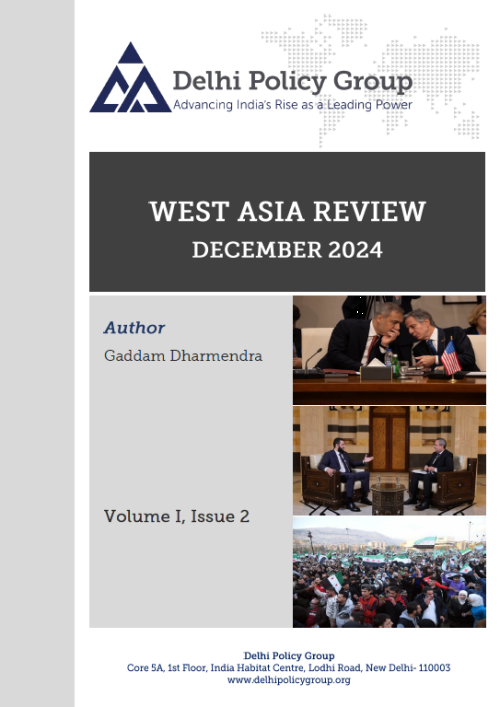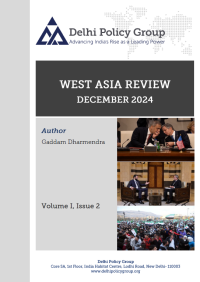West Asia Review
Date: January 03, 2025
In this issue, the author analyses in detail the developments in Syria following the collapse of the five-decade rule of the Assad family. While Ahmad al-Sharaa, the leader of the Islamist group HTS which is backed by Turkey, has assumed the leadership of Syria, major regional actors are still scrambling to assess the situation and shape their future positions.
The author points out that the battering of Hezbollah in Lebanon by Israel dealt a vital blow to Assad, leaving Iran as well Russia with diminishing options in West Asia and the Levant.
Meanwhile, Sharaa is asserting control, appointing trusted aides to senior positions, and making every effort to distance his image as an Islamist and to portray himself as a unifier of the civil war-torn country.
However, concerns remain over the radical ideology of the HTS and the presence of foreign Islamist fighters in its ranks. Overall, Syria remains fractured, with pro-Turkish groups controlling central and northwest Syria which includes major cities, and the US-backed Kurdish group SDF controlling the resource rich northeast. Syria’s south is under the control of assorted leaders, including Druze Christians. This points to a highly fluid situation.
Turning to regional players, the author observes that Qatar and Türkiye have gained influence as the leading backers of Sharaa and the HTS. A steady stream of visitors to Damascus has included delegations from Bahrain, the US, the UK, and the EU. Sharaa has expressed the hope that the incoming Trump administration will lift US sanctions, reiterated that Syria has strategic interests with Russia, and affirmed the need to maintain good relations with Saudi Arabia. These statements reflect a degree of pragmatism.
After examining in some detail the reactions of several regional and global powers, the author concludes that developments in Syria have dealt a devastating blow to Iran’s regional ambitions and expansionism. Iran has turned to Turkey to relay indirect messages to Israel that Tehran is not seeking confrontation.
To read this West Asia Review, Vol. I, Issue 2, please see the PDF attached.
The author points out that the battering of Hezbollah in Lebanon by Israel dealt a vital blow to Assad, leaving Iran as well Russia with diminishing options in West Asia and the Levant.
Meanwhile, Sharaa is asserting control, appointing trusted aides to senior positions, and making every effort to distance his image as an Islamist and to portray himself as a unifier of the civil war-torn country.
However, concerns remain over the radical ideology of the HTS and the presence of foreign Islamist fighters in its ranks. Overall, Syria remains fractured, with pro-Turkish groups controlling central and northwest Syria which includes major cities, and the US-backed Kurdish group SDF controlling the resource rich northeast. Syria’s south is under the control of assorted leaders, including Druze Christians. This points to a highly fluid situation.
Turning to regional players, the author observes that Qatar and Türkiye have gained influence as the leading backers of Sharaa and the HTS. A steady stream of visitors to Damascus has included delegations from Bahrain, the US, the UK, and the EU. Sharaa has expressed the hope that the incoming Trump administration will lift US sanctions, reiterated that Syria has strategic interests with Russia, and affirmed the need to maintain good relations with Saudi Arabia. These statements reflect a degree of pragmatism.
After examining in some detail the reactions of several regional and global powers, the author concludes that developments in Syria have dealt a devastating blow to Iran’s regional ambitions and expansionism. Iran has turned to Turkey to relay indirect messages to Israel that Tehran is not seeking confrontation.
To read this West Asia Review, Vol. I, Issue 2, please see the PDF attached.



